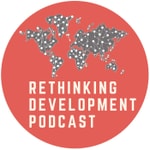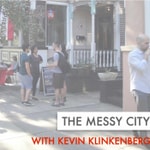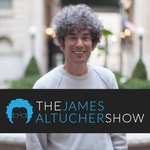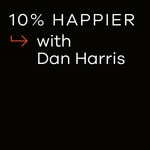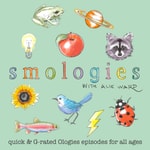Damn the Absolute! – Details, episodes & analysis
Podcast details
Technical and general information from the podcast's RSS feed.
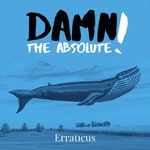
Damn the Absolute!
Jeffrey Howard
Frequency: 1 episode/43d. Total Eps: 25

damntheabsolute.substack.com
Recent rankings
Latest chart positions across Apple Podcasts and Spotify rankings.
Apple Podcasts
🇬🇧 Great Britain - philosophy
01/12/2024#84🇨🇦 Canada - philosophy
15/11/2024#93🇬🇧 Great Britain - philosophy
06/10/2024#92
Spotify
No recent rankings available
Shared links between episodes and podcasts
Links found in episode descriptions and other podcasts that share them.
See all- https://twitter.com/RizomaSchool
45 shares
- https://twitter.com/Jeffrey_Howard_
16 shares
- https://twitter.com/tiersaj
9 shares
RSS feed quality and score
Technical evaluation of the podcast's RSS feed quality and structure.
See allScore global : 59%
Publication history
Monthly episode publishing history over the past years.
S2E05 Americans Don’t Know How to Sing the Blues w/ Brad Elliott Stone & Jacob Goodson
jeudi 3 août 2023 • Duration 01:13:27
School boards and state governments have been locked in intense debates over what counts as history and whose history ought to be taught. Many of these wrestles orbit around events and cultural beliefs that the pragmatist philosopher Cornel West might refer to as “catastrophes.”
Some voices are eager to bury, ignore, or sterilize many of the truly horrendous deeds that have happened in the United States. Slavery. Segregation. Jim Crow. Genocide. The exploitation of workers. And the list goes on.
This inability to process the pain, guilt, or shame many of these events provoke in people is, arguably, a major contributing factor to the polarization, dehumanization, and political corrosiveness we encounter in both the national discourse and our local communities.
Brad Elliott Stone and Jacob Goodson believe the answer can be found in building beloved community.
They draw from the philosophies of Josiah Royce, Martin Luther King Jr, Cornel West, and William James. In their new book, Building Beloved Community in a Wounded World, they argue for ways in which we can heal the wounds inflicted on all of us by racism and economic injustices, both past and present.
Here are just a few of the questions considered throughout the conversation.
Should building beloved community be focused locally, nationally, or globally? What does it take to effectively respond to the cries of the wounded? And, how can communities better work through the emotional pain of past wrongs?
Brad Elliott Stone is Professor of Philosophy and Associate Dean in the Bellarmine College of Liberal Arts at Loyola Marymount University in Los Angeles, California.
Jacob L. Goodson is Associate Professor of Philosophy at Southwestern College in Winfield, Kansas.
Show Notes
Building Beloved Community in a Wounded World by Jacob L. Goodson, Brad Elliott Stone, and Philip Rudolph Kuehnert (2022)
Introducing Prophetic Pragmatism: A Dialogue on Hope, the Philosophy of Race, and the Spiritual Blues by Jacob L. Goodson and Brad Elliott Stone (2019)
Contingency, Irony, and Solidarity by Richard Rorty (1989)
The American Evasion of Philosophy by Cornel West (1989)
“Pragmatism and the Tragic Sense of Life” by Sidney Hook (1960)
The Tragic Sense of Life by Miguel de Unamuno (1954)
Pragmatism: A New Name for Some Old Ways of Thinking by William James (1907)
“Tender-Minded vs. Tough-Minded Thinkers” by Jeffrey Howard (2023)
S2E02 Fear of Breakdown in American Democracy w/ Noëlle McAfee (2022)
“American Democracy and Its Broken Bargaining Tables” by Daniel Layman (2021)
“Rortian Liberalism and the Problem of Truth” by Adrian Rutt (2021)
S1E12 Philosophers Need to Care About the Poor w/ Jacob Goodson (2021)
S1E19 Buddhist Reflections on Race and Liberation w/ Charles Johnson (2021)
S1E01 Richard Rorty and Achieving Our Country w/ Adrian Rutt (2020)
Music Credits
“Happy Americana” by ABCDmusic
“Empty Bottle, Empty Bed” by Mini Vandals
“Thinking Blues” by Bessie Smith
“Nobody’s Dirty Business” by Mississippi John Hurt
“That’s All Right” by Arthur Crudup
“Sissy Man Blues” by Kokomo Arnold
This is a public episode. If you would like to discuss this with other subscribers or get access to bonus episodes, visit damntheabsolute.substack.com
S2E04 Does Metamodernism Actually Move Us Past Postmodernism? w/ Jason Ānanda Josephson Storm
jeudi 30 mars 2023 • Duration 01:06:02
The German philosopher Hegel gives us a useful tool for understanding the history of ideas: thesis, antithesis, and synthesis.
We can see this clearly in the movement from the Enlightenment to romanticism to modernism and postmodernism—each intellectual movement a reaction to its predecessor, integrating what works from the previous era with new solutions to meet the demands of new problems.
But, where does that leave us now? What comes next after postmodernism?
Odds are, we’re already in it this new intellectual movement.
A growing number of people have become worn out with deconstruction and the postmodernist impulse to doubt everything, to dismantle every concept and institution. It’s become apparent this exercise which started out as emancipatory and liberating has congealed into its own set of dogmas and less-than-productive ways of being.
Eager to revitalize a more constructive mindset and free us from postmodernism’s long shadow, as he calls it, Jason Ānanda Josephson Storm makes a case for what he hopes will come next. He argues this in his recent book Metamodernism: The Future of Theory (2021).
Chair and professor of religion and chair of science and technology studies at Williams College, he aims to take us through postmodernism to metamodernism, to establish a new approach to producing what he calls “humble knowledge.” He’s trying to create a paradigm shift, not just describe what is happening.
He believes metamodernism is about the future of all disciplines, especially the human sciences. Ultimately, metamodernism is about hope. It’s a vision whose ethical and political goals are rooted in compassion and multispecies flourishing.
And here are a few things we consider during our conversation:
How does metamodernism utilize skepticism without falling prey to either nihilism or a dogmatic doubting of everything? Why has postmodernism possibly, I say, possibly, reached a dead end? What is the relationship between metamodernism and Pragmatism? And what pressing political or social problems can metamodernism help us solve?
Show Notes:
The Myth of Disenchantment: Magic, Modernity and the Birth of the Human Sciences by Jason Ānanda Josephson Storm (2017)
“The Task of the Translator” in Illuminations: Essays and Reflections by Walter Benjamin (1968)
“What Is a ‘Relevant’ Translation?” by Jacques Derrida (2001)
“An Interview with Moyo Okediji on Metamodernism” by Jason Ānanda Josephson Storm (2022)
“Black Skin, White Kins: Metamodern Masks, Multiple Mimesis” in Diaspora and Visual Culture: Representing Africans and Jews by Moyo Okediji (1999)
Metamodernism: The Future of Theory by Jason Ānanda Josephson Storm (2021)
S1E07 Charles Peirce and Inquiry as an Act of Love w/ David O’Hara (2021)
Philosophy and the Mirror of Nature by Richard Rorty (1979)
S2E03 Literature Must Be an Unsettling Force for Democracy w/ Elin Danielsen Huckerby (2022)
“Rortian Liberalism and the Problem of Truth” by Adrian Rutt (2021)
“Truth as Pragmatism’s Only Hope” by Jon Alan Schmidt (2022)
“Why We Won’t Ever Arrive at Truth” by Ian Cran (2022)
“The Power of One Idea” by Jeffrey Howard (2020)
Music Credits:
“Suspicious” by Nicolas Gasparini licensed under a Creative Commons License
“Happy Americana” by ABCDmusic
“Carmen – Habanera (Piano Version) Georges Bizet” by Nicolas Gasparini licensed under a Creative Commons License
“Old Bossa” by Twin Musicom licensed under a Creative Commons License
“Chill Wave” by Kevin MacLeod licensed under a Creative Commons License
“Bet On It” by Silent Partner licensed under a Creative Commons License
This is a public episode. If you would like to discuss this with other subscribers or get access to bonus episodes, visit damntheabsolute.substack.com
S1E15 Making the Commons More Common w/ Neal Gorenflo
mercredi 28 avril 2021 • Duration 39:05
When it comes to resource management, there are two dominant forces that exert tremendous influence on who gets what: the market and the state. Sometimes these two entities compete or conflict. Other times they collaborate, and even conspire—to the great detriment of communities. Either can result in environmental exploitation, extreme inequality or poverty, erasure of culture and place, and invite an alienation that is generated by people having limited say in what happens to their communities.
Yet there remains a resource management system whose history runs deeper than either the market or the state—and that is the commons. Distinguished by its clearly demarcated membership, it is fiercely democratic and practices a more locally-oriented governance regime. A given resource is apportioned and stewarded by members according to norms they determine within their community. For the most part, neither the market nor the state are expected or encouraged to intervene. One is either a contributing member of the commons or they are not.
But if commons have such a rich heritage, then why have they become less prevalent in the United States and in what are considered "developed countries"?
Jeffrey Howard speaks with Neal Gorenflo. He is the executive director of Shareable, an award-winning nonprofit news outlet, action network, and consultancy focused on the latest innovations in resource sharing, the commons, and the solidarity economy. He is also the author of Sharing Cities: Activating the Urban Commons (2018). In addition to the state and the market, he proposes the commons as a way to foster small-scale experiments to see what works best in any given community. This pragmatic approach to solutions is geared toward addressing needs more than trying to satisfy any particular ideology. As the saying goes, ideologies divide us, while needs unify us.
Now, looking further into the twenty-first century, what would it take for the commons to become a prevailing paradigm for resource management? What does a Sharing Cities approach to urban development look like? And what prevents a commons from being co-opted or captured by market or state forces?
Show Notes:
A Year of Living Locally by Neal Gorenflo (2020)
Sharing Cities: Activating the Urban Commons by Neal Gorenflo (2018)
Think Like a Commoner: A Short Introduction to the Life of the Commons by David Bollier (2014)
S1E11 A Small Farm Future w/ Chris Smaje (2021)
S1E08 Embracing Subsistence Agriculture During the Collapse of Industrial Capitalism w/ Ashley Colby (2021)
S1E03 Placemaking and the Benefits of Local Scale w/ Jaime Izurieta (2020)
"Coops in Spain's Basque Region Soften Capitalism's Rough Edges" by Peter S. Goodman (2020)
"A Land Value Tax Fosters Strong Community" by Matthew Downhour (2020)
"The Tragedy of the Commons" by Garrett Hardin (1968)
"All the Lonely People: The Atomized Generation" by Willow Liana (2020)
"Governing the Commons: The Evolution of Institutions for Collective Action" by Elinor Ostrom (1990)
"A General Framework for Analyzing Sustainability of Social-Ecological Systems" by Elinor Ostrom (2009)
"Collective Action and the Evolution of Social Norms" by Elinor Ostrom (2000)
"Beyond Markets and States: Polycentric Governance of Complex Economic Systems" by Elinor Ostrom (2010)
"America Needs to Build Strong Towns, Not More Infrastructure" by Jacqueline M. Kory-Westlund (2020)
This is a public episode. If you would like to discuss this with other subscribers or get access to bonus episodes, visit damntheabsolute.substack.com
S1E14 A Tool for a Pluralistic World w/ Justin Marshall
mercredi 14 avril 2021 • Duration 38:20
Coming to some semblance of consensus opinion is a paramount challenge in a pluralistic world. We disagree on what constitutes truth and how we ought to obtain it, whether our undertaking be moral, scientific, or political.
It has been a common practice in Western philosophy to focus on uncovering an accurate reflection of reality, in hopes that by showing others these true representations of the world, we can bring our community members into agreement. This view holds that if we can clearly present objective truth, we can create meaningful consensus en route to fostering a more peaceful and thriving existence for humanity.
In reality, people disagree—oftentimes vehemently, and even violently—on what counts as evidence and which methods for discovering truth are most convincing. We pit our chosen experts against one another. Your preferred philosopher or politician may persuade you and your circle of friends, but what do we do when others are unmoved by what seems, to us, to be so obviously true?
Jeffrey Howard speaks with Justin Marshall, a pragmatist philosopher with a graduate degree from George Mason University. He argues that better understanding how our beliefs are formed can help us to navigate the ways in which truth and divergent viewpoints continually perplex liberal democracies and pluralistic societies. Drawing inspiration from thinkers like William James, Charles Sanders Peirce, and Richard Rorty, he explains the roles personal temperament, experiences, language, and culture play in shaping truth. He challenges us to practice more intellectual humility and to reconsider the idea that we can know whether our ideas actually hook up to reality in any meaningful or certain way.
To what degree are our beliefs reflections of our temperaments rather than reflections of objective reality? How might it benefit us to view language as a tool for helping us to better cope with reality rather than as a one-to-one representation of the world? If our notions of truth are contingent upon our particular cultures, personal histories, or demographic backgrounds, how do we avoid the trap of philosophical relativism? And, what social and political solutions can philosophical pragmatism offer us in a pluralistic world?
Show Notes
“The Fixation of Belief” by Charles Sanders Peirce (1877)
Pragmatism: A New Name for Some Old Ways of Thinking by William James (1907)
“Human Rights, Rationality, and Sentimentality” by Richard Rorty (1998)
“What Is It Like to Be a Bat?” by Thomas Nagel (1974)
The Critique of Pure Reason by Immanuel Kant (1781)
Overdoing Democracy by Robert Talisse (2019)
Pragmatism, Postmodernism, and the Future of Philosophy by John Stuhr (2003)
S1E07 Charles Sanders Peirce and Inquiry as an Act of Love w/ David O’Hara (2021)
S1E01 Richard Rorty and Achieving Our Country w/ Adrian Rutt (2020)
This is a public episode. If you would like to discuss this with other subscribers or get access to bonus episodes, visit damntheabsolute.substack.com
S1E13 The Philosophy of Lived Experience w/ Henriikka Hannula
mercredi 31 mars 2021 • Duration 44:42
There has long been a bit of jousting between the human and natural sciences over who is more rigorous or which method is better capable of providing us with facts about the world. For certain types of empiricists, this jockeying for epistemological status and justification has tended to skew in favor of the natural sciences. And given the premium some cultures place on prediction, control, and the power that comes with laying hold of causal laws, the natural sciences have enjoyed abundant prestige over the past two centuries.
In hopes of garnering a similar reputation, some in the human sciences have made significant efforts to modify their methods to more closely resemble those used in the natural sciences. But can we study human experience in the same way we tend to examine the natural world? Just as there are reliable causal laws that can be generalized across the globe, are there moral or social laws that dictate the dynamics of human history?
In the nineteenth century, the German philosopher Wilhelm Dilthey attempted to make a clear distinction between the methods and questions used by the natural sciences and those employed by the human sciences. Whereas the natural sciences are looking for generalizable laws or supposed regularities about the physical world, he proposes that the human sciences ought to focus on understanding and interpreting lived experience.
Lived experience contrasts with abstract or theoretical representations of experience, which are more like idealized forms of what it means to be human, largely divorced from the flesh and blood of history. Lived experience, on the other hand, requires that we interpret and continually reinterpret what it means to be human from a given point in history. This is based on what individuals communicate about what it feels like to be them. This is sometimes also applied to questions pertaining to racial identity, gender dynamics, economic background, and the various ways in which people experience life differently from one another.
Jeffrey Howard speaks with Henriikka Hannula, a doctoral candidate at the University of Vienna, in Austria. Originally from Finland, her research focuses on late-nineteenth-century German philosophy, specifically that of Wilhelm Dilthey. She explains the central role the concepts of historicism, lived experience, and hermeneutics play in Dilthey’s philosophy. In what could also be considered a rallying cry for the human sciences, Hannula argues for a rigorous and systematic approach to studying culture and society that is informed by the work of Wilhelm Dilthey.
Now, what reasons do we have to think human experiences and the natural world should be studied differently? Why might it be more productive to study the human condition at the nexus of lived experience rather than through an abstract or detached framework? If gaining a meaningful understanding of culture requires that we continually have to reinterpret human interactions and events, then how can we ever arrive at any certain knowledge in the human sciences?
Show NotesTheory and Practice in Wilhelm Dilthey’s Historiography by Henriikka Hannula (2018)
Wilhelm Dilthey as an Introduction by Matthias Jung (1996)
Truth and Method by Hans-Georg Gadamer (1960)
The Cambridge Companion to Hermeneutics edited by Michael N. Forster and Kristin Gjesdal (2019)
The German Historicist Tradition by Frederick C. Beiser (2011)
Schleiermacher’s Hermeneutical System in Relation to Earlier Protestant Hermeneutics by Wilhelm Dilthey (1860)
Uncertain Victory: Social Democracy and Progressivism in European and American Thought, 1870-1920 by James T. Kloppenberg (1986)
The Varieties of Religious Experience by William James (1902)
This is a public episode. If you would like to discuss this with other subscribers or get access to bonus episodes, visit damntheabsolute.substack.com
S1E12 Philosophers Need to Care About the Poor w/ Jacob Goodson
mercredi 17 mars 2021 • Duration 01:04:25
While some philosophers view their primary task as one of discovering the nature of reality and then describing it accurately for the rest of us, others have practiced philosophy as an edifying enterprise, asserting that it should be employed to help us better resolve social and political problems—to change the world.
Although both of these approaches have been utilized throughout history, the philosopher John McCumber argues that this later movement in philosophy was mostly purged from academia in the United States starting during the Cold War. 1950s McCarthyism and the “Red Scare” made many American politicians and professors wary of becoming blacklisted or punished for expressing viewpoints associated with communism. These views included concerns for the poor and economically-disadvantaged, support for labor unions, and outcries regarding exploitative economic practices. In turn, this meant that many academics were pushed out of their positions at colleges and universities if they engaged in rhetoric or activities that were perceived as being too “red.”
This academic McCarthyism, according to McCumber, further enabled the ascent of analytic philosophy, a method that attempts to describe the world in the most linguistically precise way possible, leaning heavily toward a mathematical-like language to capture an accurate picture of reality. As a result, philosophy departments throughout the United States became less interested in engaging in edifying philosophy. Consequently, academic McCarthyism helped elevate subjects like mathematics, philosophy of science, and logic at the expense of political and social philosophy.
In the later part of the twentieth century, Richard Rorty ushered in a new era of philosophy. Turning their own methods against them, Rorty argued that we ought to jettison analytic philosophy, instead focusing on the practical consequences of our ideas as they manifest in politics and society. Rejecting a representationalist approach, Rorty spent much of his career rallying philosophers around a more edifying position, suggesting that we’re better served by focusing on how ideas can advance society and improve social conditions for people—especially the poor and marginalized. In fact, Rorty went so far as to make several political predictions regarding the practical uses of philosophy and literature in the twenty-first century. On numerous occasions, he outlined how they would be applied throughout society to transform politics following what he imagines will be the darkest years in American history—from 2014 to 2044.
Jeffrey Howard speaks with Jacob Goodson, Associate Professor of Philosophy at Southwestern College in Winfield, Kansas. Goodson believes that, despite some of Rorty’s philosophical shortcomings, we ought to embrace a more edifying orientation toward ideas. In his recent book, The Dark Years?: Philosophy, Politics, and the Problem of Predictions (2020), he considers Rorty’s political predictions and how they might help guide us toward a better future. Goodson examines which predictions have already been realized—including the election of a “strongman” in 2016—which ones might be coming to fruition now, and whether Rorty’s conception of an idealized future will unfold in the way the neopragmatist philosopher hopes it will.
A few questions to ponder. In what ways might analytic philosophy be inadequate for addressing social and political problems? Should philosophers focus on changing society or is their primary role to help us better understand the nature of reality? What does philosophy stand to lose by following Richard Rorty into his neopragmatist vision for the discipline? And where should we place our hope for the future?
Show Notes
The Dark Years?: Philosophy, Politics, and The Problem of Predictions by Jacob Goodson (2020)
Achieving Our Country: Leftist Thought in Twentieth-Century America by Richard Rorty (1997)
Contingency, Irony, and Solidarity by Richard Rorty (1989)
Philosophy and the Mirror of Nature by Richard Rorty (1979)
Overdoing Democracy: Why We Must Put Politics in Its Place by Robert Talisse (2019)
“Suspending Politics to Save Democracy” by Lawrence Torcello (2020)
“We’re Overdoing Democracy. But Why?” by Kevin Vallier (2019)
The Philosophy Scare: The Politics of Reason in the Early Cold War by John McCumber (2016)
Time in a Ditch: American Philosophy and the McCarthy Era by John McCumber (2001)
Philosophy and Social Hope by Richard Rorty (2000)
Richard Rorty: The Making of an American Philosopher by Neil Gross (2008)
“Self-Reliance” by Ralph Waldo Emerson (1841)
S1E01 Richard Rorty and Achieving Our Country with Adrian Rutt (2020)
The Future of Religion by Richard Rorty and Gianni Vattimo (2007)
This is a public episode. If you would like to discuss this with other subscribers or get access to bonus episodes, visit damntheabsolute.substack.com
S1E11 A Small Farm Future w/ Chris Smaje
mercredi 3 mars 2021 • Duration 50:03
It wouldn’t be unreasonable to say that we are always in an age of crisis. Whether this entails more apocalyptic tendencies or more tempered framings, crisis seems to be a constant companion throughout human history. At present, crises abound regarding climate change, exploitation of land, and soil degradation. We’re seeing major cracks in political economies, many of which stem from misguided cultural paradigms.
With an industrialized global economy based on fossil fuels and an ethos that disregards limits, we find ourselves in an unsustainable present, with what is becoming an increasingly likely catastrophic future. Most people agree that we can’t continue along the same trajectory we're currently on. Yet, many attempts to forestall the further collapse of prevailing systems appear insufficient for the tasks at hand.
What will it take to shift toward more egalitarian and low-carbon societies? Is it possible for global supply chains to be ecologically sustainable and ethically justifiable? What negative impacts do global and industrialized political economies have regarding personal autonomy, spiritual fulfillment, community connectedness, and ecological conviviality? When should we practice skepticism toward centralized and tech-optimist solutions to our many crises?
Jeffrey Howard speaks with Chris Smaje, a farmer and social scientist that has coworked a small farm in southwest England for more than 15 years. In his new book, A Small Farm Future (2020), he argues that societies built around local economies, self-provisioning, agricultural diversity, and commoning of certain ecological resources are our best shot for creating a sustainable future—in terms of the ecological, nutritional, and psychosocial.
In this small farm future, Smaje doesn’t imply that there will be no place for large farms or industrialization. Similarly, he doesn’t propose this vision as a panacea for all our problems nor as a utopia looking backward toward a romanticized past. There will be trade-offs. Difficult ones. He offers a melioristic way forward, believing that ecological and moral limits are going to force our hand, compelling us to consider more radical alternatives than the status quo allows.
A Small Farm Future advances a surprising amount of optimism despite how much dominant systems are not only showing signs of significant breakdown—made more pronounced by the COVID pandemic—but suggesting their likely collapse. Whether or not the types of collapse Smaje discusses actually happen in the ways he anticipates, he believes that the earth’s population will be better off if we shift toward small-holding property ownership, oriented around place-based communities and local economies.
Several questions worth contemplating. In what ways does scaling up systems make us less able to deal with crises effectively? What advantages do permaculture and regenerative agriculture have over large-scale, monocultural approaches? What are some politically feasible ways to make land access more egalitarian? And what trade-offs might we have to make in moving toward a small farm future?
Show Notes
A Small Farm Future: Making the Case for a Society Built Around Local Economies, Self-Provisioning, Agricultural Diversity, and a Shared Earth by Chris Smaje (2021)
Degrowth by Giorgos Kallis (2018)
Limits: Why Malthus Was Wrong and Why Environmentalists Should Care by Giorgos Kallis (2019)
Less Is More: How Degrowth Will Save the World by Jason Hickel (2021)
Farming While Black: Soul Fire Farm's Practical Guide to Liberation on Land by Leah Penniman (2018)
Smallholders, Householders: Farm Families and the Ecology of Intensive, Sustainable Agriculture by Robert McC. Netting (1993)
Stuffed and Starved: Markets, Power, and the Hidden Battle for the World’s Food System by Raj Patel (2007)
Peasants and the Art of Farming by Jan Douwe van der Ploeg (2013)
Against the Grain: A Deep History of the Earliest States by James Scott (2017)
Ramp Hollow: The Ordeal of Appalachia by Steven Stoll (2017)
A Small Farm Future blog by Chris Smaje
S1E08 Subsistence Agriculture During the Collapse of Industria Capitalism w/ Ashley Colby (2021)
This is a public episode. If you would like to discuss this with other subscribers or get access to bonus episodes, visit damntheabsolute.substack.com
S1E10 Unschooling and Gentle Parenting w/ Tiersa McQueen
mercredi 17 février 2021 • Duration 40:54
Mass schooling is a relatively recent phenomenon, an experiment in education that gained steam following the industrial revolution, becoming increasingly widespread in the nineteenth century, in part, due to advocates like Horace Mann. Mann was a social reformer skeptical of parents’ abilities to properly educate their children to become future employees and democratic citizens. He believed these common schools, as they were called, could remedy the lack of proper discipline found in some homes. Notably, Mann homeschooled his own children outside the dictates of these common schools he advanced for other people’s children. Further, he and his fellow reformers worried about the flood of diverse immigrant families that were challenging contemporary cultural and social hegemony. Mann went so far as to argue that these marginalized groups were “wholly of another kind in morals and intellect.”
Mass schooling champions asserted that compulsory education was necessary for preventing the corruption of young children in the hands of those they deemed ill-suited to properly foster their moral and intellectual development—namely, their families and respective communities. Traditional schools were to be the means of instilling a particular sense of shared American identity that would allow American democracy to function well.
This is not to color all mass schooling advocates as cultural chauvinists but to highlight that what we consider traditional schooling today is, in many ways, informed by the notion that parents and children lack the skills required to learn outside the schooling system. Traditional schooling embraces a view that learning best occurs when a uniform curriculum is imposed upon young minds, children being segregated according to age within rigid classroom structures. It is commonly held that becoming a successful and contributing member of a democratic society requires going through the mass schooling system. Conventional schooling’s primary goal is knowledge acquisition—with everything else being secondary. Students tend to be treated as passive subjects, receptacles for the knowledge considered necessary by their teachers, school system administrators, and other centralized educational authorities.
What might a more student-centered learning environment look like? What if instead of imposing a universal curriculum onto children, they were provided with the resources needed to help them achieve their own self-selected goals? What if becoming a socially and emotionally intelligent human being was the primary goal of an educational approach, rather than being supplemental to knowledge acquisition?
Jeffrey Howard speaks with Tiersa McQueen, an unschooling parent of four children. Following her own experiences as a teacher and her children’s encounters with mass schooling, her family has embraced unschooling and gentle parenting. According to McQueen, these two philosophies go hand-in-hand, holding central the idea that children deserve full respect, greater autonomy, and tailored support as they learn how to thrive as young people—and eventually, as adults.
Despite her advocacy for self-directed learning, she acknowledges that she isn’t completely opposed to schooling. It’s still an option for her kids should they choose it. However, as a Black parent, she is well aware of the school-to-prison pipeline and the reality that Black children are punished far more frequently and severely than other children in schooling environments. She expresses that she can’t wait for traditional schools to change in order for them to become safe and nurturing places for her children.
McQueen considers the criticisms lobbed at unschoolers and self-directed education advocates, suggesting that many of them are stereotypes pertaining to a type of homeschooler that doesn’t really exist anymore. Unschooling and gentle parenting are difficult for some people to imagine, and have their own share of difficulties, but she observes that her relationships with her own children have never been better. She also notes that the depth of her children’s learning has increased dramatically as they’ve been able to direct time and attention toward their own goals and interests.
Some things to further consider. A century ago, the philosopher and social activist John Dewey proposed a notion of education as “learning by doing,” emphasizing the need for practicality in meaningful learning. What might happen if more young minds were afforded this approach, supported by family and community members as they experimented with overcoming the challenges they face in their particular social environments? In what ways might an unschooling approach to learning better prepare people to navigate the demands and problems unique to their local contexts? And how might unschooling better prepare children to participate in democratic living?
Show Notes
“When You Get Into Unschooling, It’s Almost Like a Religion” by Molly Worthen (2020)
Raising Free People: Unschooling as Liberation and Healing Work by Akilah S. Richards (2020)
Untigering: Peaceful Parenting for the Deconstructing Tiger Parent by Iris Chen (2020)
Free to Learn: Why Unleashing the Instinct to Play Will Make Our Children Happier, More Self-Reliant, and Better Students for Life by Peter Gray (2013)
“First Impressions of an Unschooling School” by Jeffrey Howard (2018)
Unschooled: Raising Curious, Well-Educated Children Outside the Conventional Classroom by Kerry McDonald (2019)
Horace Mann’s Troubling Legacy: The Education of Democratic Citizens by Bob Pepperman Taylor (2010)
“My Pedagogic Creed” by John Dewey (1897)
Democracy and Education by John Dewey (1916)
S1E19 Buddhist Reflections on Race and Liberation w/ Charles Johnson (2021)
This is a public episode. If you would like to discuss this with other subscribers or get access to bonus episodes, visit damntheabsolute.substack.com
S1E09 Trust in a Polarized Age w/ Kevin Vallier
mercredi 3 février 2021 • Duration 53:03
Trust plays a central role in democratic societies. If we can’t rely upon fellow community members to act in accordance with generally accepted norms, then we’re going to be in a really bad way. Social trust in the US has fallen dramatically. In the early 1970s, around half of Americans said that most people can be trusted. Today, less than a third of Americans feel that way.
Similarly, political trust—our faith in political institutions and processes to function properly—has declined as well. In the 1960s, more than 70 percent of Americans said that they trusted the federal government always or most of the time. Today, that figure hovers around 17 percent.
In an idealized liberal democracy, a healthy dose of skepticism toward politicians and government officials is vital for assuring fruitful outcomes. However, we must be careful so that that accountability mechanism doesn’t turn into a cynicism that corrodes democratic norms. Rampant distrust prevents us from solving problems with our neighbors and broader communities. Alternatively, trust helps to grease the wheels of democracy. This enables us to better overcome inherited differences and to arrive at more pluralistic perspectives on the problems we face.
Instead, we find ourselves in an increasingly polarized age, where we seem less and less to share common realities or notions of truth. Distrust breeds polarization, and polarization begets more distrust. When we no longer hold the same media or news sources in common or we maintain a thoroughgoing distrust of media institutions, what will prevent us from further polarization?
Jeffrey Howard speaks with Kevin Vallier, a political philosopher and associate professor of philosophy at Bowling Green State University, where he directs their program in Philosophy, Politics, Economics, and Law. In his new book Trust in a Polarized Age (2020), Vallier advocates for public reason liberalism as a way of revitalizing social and political trust. He draws on empirical trust literature to argue a way forward for reducing polarization. He proposes that we reinvest in liberal democratic political and economic institutions: high-quality governance, procedural fairness, markets, social welfare programs, and freedom of association. Vallier believes that if we can educate ourselves on how elections and political parties take advantage of mistrust and polarization, we can protect American democracy against new authoritarian threats.
This raises some questions. What relationship is there between the scope of government and the degree of political trust in the broader society? Rather than view our political opponents as essentially evil, what might happen instead if we primarily acted as if they were misguided or ill-informed? How much more trust would be fostered if we focused locally rather than turning our eyes toward Washington DC or to the headquarters of multinational firms? What can we do to restore trust in the media? And what hope do we have of breaking the distrust-divergence feedback loop?
Show Notes
Trust in a Polarized Age by Kevin Vallier (2020)
“Trust in a Age of Reactionaries and Revolutionaries” by Matthew Downhour (2021)
“We’re Overdoing Democracy. But Why?” by Kevin Vallier (2019)
“Suspending Politics to Save Democracy” by Lawrence Torcello (2020)
The Spirit of the Disciplines by Dallas Willard (1996)
The Divine Conspiracy by Dallas Willard (1998)
Free to Choose: A Personal Statement by Milton Friedman and Rose Friedman (1990)
Capitalism and Freedom by Milton Friedman (2002)
The Theory of Moral Sentiments by Adam Smith (1759)
The Wealth of Nations by Adam Smith (1776)
A Theory of Justice by John Rawls (1971)
Political Liberalism by John Rawls (1993)
The Constitution of Liberty by F.A. Hayek (1960)
Law, Legislation, and Liberty, Vol I.: Rules and Order by F. A. Hayek (1973)
The Order of Public Reason by Gerald Gaus (2010)
S1E01 Richard Rorty and Achieving Our Country w/ Adrian Rutt (2020)
S1E02 Toward a Politics of Uncertainty w/ Daniel Wortel-London (2020)
This is a public episode. If you would like to discuss this with other subscribers or get access to bonus episodes, visit damntheabsolute.substack.com
S1E08 Subsistence Agriculture During the Collapse of Industrial Capitalism w/ Ashley Colby
mercredi 20 janvier 2021 • Duration 46:12
We occupy human environments that are overlapped by numerous social, moral, and political systems. Some of these interlock while it’s unclear how exactly others relate to one another. The more theoretically-minded among us—and the more ideology-craving parts within us—tend to reach for rather all-encompassing frameworks to help us make sense of what creates social and environmental ills. We look around ourselves and see nutritious food shortages, ecological exploitation, social injustices, atomization, political radicalization, and tyranny. And depending on our ideological proclivities, we use divergent language as tools for identifying their sources, in hopes of then addressing these identified problems—using terms like socialism, capitalism, fascism, or liberalism, to name a few.
Abstractions or idealized conceptions like these have important roles to play, but how helpful are they in bringing about social change? What if instead of leading out with political ideology or philosophical theorizing, we focused our efforts on meeting needs as they present themselves? What would happen if instead of organizing with an eye toward finding like-minded individuals that share our same dogmas and creeds, we targeted concrete problems that we face within particular places or communities?
Jeffrey Howard speaks with Ashley Colby, a sociologist and author of Subsistence Agriculture in the United States: Reconnecting to Work, Nature, and Community (2020). She earned her PhD focusing on environmental sociology from Washington State University in 2018. She is currently pursuing research projects based in Uruguay, where she has recently founded Rizoma Field School for experiential learning in the area of sustainability and agroecology. Ashley is a new member of the Executive Board of the Sustainable Consumption Research and Action Initiative (SCORAI) based in North America.
Colby spotlights subsistence food producers in the United States, uncovering how “practitioner networks” empower community members with different ideological and political commitments to come together and solve local problems. She believes that our current mass agricultural system—a central element of what she frequently refers to as “industrial capitalism”—is not only in crisis but moving toward gradual collapse. Drawing from original ethnographic studies and her own experience as a subsistence food producer, she explores some of the more promising alternatives to the current system, or “shadow structures,” as she calls them.
She takes on the misconception that subsistence farming only happens in rural areas and in the Global South, highlighting food producers and chicken keepers in the Chicago area. She further expresses optimism that as industrial farming, consumerism, and global supply chains continue to push beyond their ecological and moral limits, that permaculture and subsistence agriculture will serve as the fruitful nexus for what is becoming the next collection of social and political systems that will enable communities to thrive beyond the twenty-first century.
Despite Colby’s optimism, how feasible or desirable are these movements away from mass-scale agriculture? How much meaningful change can happen when political activists take this more practical approach to problems rather than leading out with theoretical frameworks? What role does polemical theorizing have in bringing about social change?
Show Notes:
Subsistence Agriculture in the United States: Reconnecting to Work, Nature, and Community by Ashley Colby (2020)
Wandering God by Morris Berman (2000)
Coming to Our Senses: Body and Spirit in the Hidden History of the West by Morris Berman (1989)
The Reenchantment of the World by Morris Berman (1981)
The Art of Loving by Eric Fromm (1956)
On the Road by Jack Kerouac (1957)
“Self-Reliance” by Ralph Waldo Emerson (1841)
Walden by Henry David Thoreau (1854)
My First Summer in the Sierra by John Muir (1911)
Straw Dogs BY John Gray (2002)
Desert Solitaire by Edward Abbey (1968)
S1E16 Where Do Animals Fit Into Human Flourishing? w/ Ike Sharpless (2021)
Zen and the Art of Motorcycle Maintenance: An Inquiry into Values by Robert Pirsig (1974)
Critical Theory (The Frankfurt School)
S1E11 A Small Farm Future w/ Chris Smaje (2021)
S1E15 Making the Commons More Common w/ Neal Gorenflo (2021)
This is a public episode. If you would like to discuss this with other subscribers or get access to bonus episodes, visit damntheabsolute.substack.com
